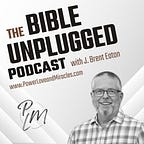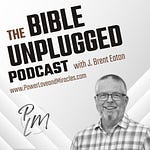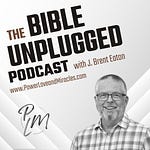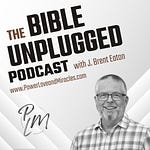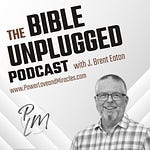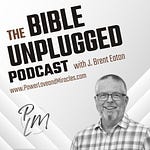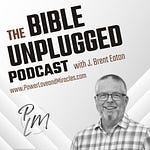Introduction
• The nation had enjoyed a long period of stability and prosperity under a king that had ruled for over 50 years. Many citizens of the kingdom had never known another ruler. The death of their beloved king led to a period of political and spiritual decline, but God had prepared a messenger to call the nation back to their first love.
• I’m Brent, and this is episode 63 of The Bible Unplugged. We take a detailed look at how God called Isaiah to be a prophet through a profound vision in the temple.
• Please take a minute to look at the show notes for this episode at PowerLoveandMiracles.com.
Background
• Isaiah’s call to be a prophet is one of the most stunning visions ever recorded. His vision of God in the temple wasn’t a dream or a symbolic parable—it was a personal call to ministry, a national wake-up call, and a glimpse into the very throne room of heaven.
• This vision came at a critical time in Israel’s history. King Uzziah had ruled Judah for 52 years. Under his leadership the nation had peace, wealth, and military strength. But with his death came uncertainty and fear—a nation wondering what would happen next.
• Religiously, things looked good on the surface. The Temple rituals continued. The sacrifices never stopped. But hearts were cold, worship was mechanical, and faith had become a formality.
• It’s in this uneasy atmosphere—when the earthly throne stood empty—that Isaiah saw the heavenly throne filled.
Who was Isaiah
• Isaiah’s name in Hebrew is “Yeshayahu” which means “Yahweh is salvation.” He was likely from a noble or priestly family in Jerusalem, which explains his detailed knowledge of the Temple layout and ceremonies.
• He served during the reigns of four kings—Uzziah, Jotham, Ahaz, and Hezekiah—and his ministry spanned roughly 40 years.
Significance of the Vision
• Isaiah 6:1 says, “In the year that Uzziah died, I saw the Lord.”
• Isaiah saw the Lord sitting on a throne, “high and lifted up.” This is the same imagery Isaiah later used to describe the Suffering Servant, the Messiah who would restore the kingdom.
• Isaiah said that the train of the Lord’s robe filled the temple. In that time, a conquered king’s robe would be sewn into the victor king’s train. The Lord’s train filled the temple because he was Lord over all nations.
• There are angels, called seraphim, above the Lord. Each had six wings that covered their heads and their feet and gave them the ability to fly. The description isn’t incidental. This shows that the Lord’s servants took a posture of pure reverence, humility, and service.
• The seraphim called out to each other, “Holy, holy, holy, is Yahweh of Armies! The whole earth is full of his glory!” Repeating the word holy isn’t just there for dramatic effect. We can describe something as good, better, or best. The Hebrew people just repeated the word to show the significance. The Lord is the holiest of all beings.
Isaiah’s Response
• Confronted with God’s holiness, Isaiah’s first words aren’t worship—they’re despair.
• “Woe is me! For I am undone; I am a man of unclean lips, and I live among a people of unclean lips.”
• That’s striking because just one chapter earlier, Isaiah pronounced a series of woes on others. Now he realizes the same verdict applies to him. He doesn’t compare himself to other sinners—he compares himself to divine holiness, and in that light even a prophet feels ruined.
The Cleansing Fire
• Then, one of the seraphim flew to Isaiah with a live coal taken from the altar used for sacrifices.
• Isaiah said, “He touched my mouth with it and said, ‘Behold, this has touched your lips; your guilt is taken away, and your sin atoned for.’”
• That moment embodies grace. The fire that once consumed the sacrifice now purifies the prophet. Isaiah’s guilt isn’t erased because he was worthy; it’s covered because God made provision through sacrifice.
• Isaiah didn’t say the coal burned his lips, only touched them. Holiness didn’t destroy him—it transformed him.
Isaiah’s Response
• Isaiah then heard the Lord say, “Whom shall I send, and who will go for us?”
• Without hesitation, Isaiah answered, “Here am I; send me.”
• Only after cleansing does God call him to go. Grace precedes mission. Isaiah’s readiness wasn’t born of ambition but gratitude.
• But the mission would not be easy. God told him to preach to a people who would hear but not understand—a message of truth to hardened hearts. Still, buried in the end of the chapter is a promise: a holy seed remains. Even in judgment, God preserves hope—the promise of the Messiah we find in chapter 11.
Important Takeaways
• There are some important takeaways from Isaiah’s vision.
• God got Isaiah’s attention. God does the same for us. God’s assignment and plan only show up after God removes distractions.
• Our words matter. The same lips that once spoke doubt or complaint can become the vessel for God’s truth.
The Challenge for Today
• I have some challenges for you this week.
• Look around you. Not just your environment, but the condition of the world you live in. Ask yourself: Where have I seen God’s holiness lately? If that awareness brings discomfort, that’s not punishment—it’s preparation.
• Let your worship this week move beyond songs and sermons. Sit quietly and let the holiness of God search your heart.
• Ask for a personal “coal-touching” moment—where God’s grace burns away what holds you back from saying, “Here am I, send me.”
The conclusion
• We have reached the end of the episode, but there’s some more coming.
• I hope this has been helpful. If so, take a minute to give this podcast a high rating and share it with someone you know.
• In the next episode, we look at a prophecy from the book of Joel that connects the dreams and visions of the Old Testament with us today.
• My prayer for you is you would have the energy and drive to carry out the mission that God has place on your heart .
• Have a blessed week.
The disclaimers
• Just to let you know:
• All opinions are my own. If you agree, keep listening. If you don’t… keep listening. If you listen long enough, you might learn something you didn’t know before.
• All Bible quotations come from the World English Bible which is a public domain work.
• Our show theme song is “Awesome Call” by Kevin MacLeod and is available under a Creative Commons license.
• The content of this podcast is copyrighted 2025 by J. Brent Eaton
• This has been a Power Love and Miracles production

